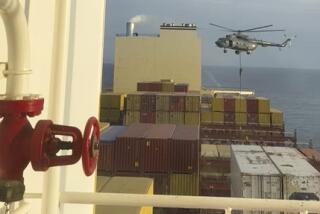Where Angels Fear to Tread
- Share via
Polishing his silver bullets and mounting his trusty steed, President Reagan has gone riding off into a fog of rhetoric in his latest role as the Lone Ranger of the Persian Gulf. From his top aides have come implicit threats of a preemptive military strike against Iran’s new anti-ship missiles. Iran, in short, is being warned that it could find American bombs falling on its territory even if it commits no aggression against a U.S. ship. This is a risky challenge to make. Far more risky is the prospect that it might be carried out.
The anti-ship missiles that Iran has bought from China have a range of 50 miles, more than enough to interdict the 30-mile-wide Strait of Hormuz at the entrance to the gulf. So far the missiles haven’t been emplaced. The United States is warning that they had better not be. The presumed concerns are that the missiles might be used against U.S.-flag ships, or that they could be used against other shipping, threatening a shutdown in gulf oil traffic. The United States is saying that it is reserving the option of striking first to prevent that.
But Iran itself could hardly escape the consequences if oil shipments through the gulf were pinched or halted, and without oil exports Iran would become a pauper, unable to finance its war with Iraq. This strongly argues against, even if it doesn’t wholly preclude, some act of self-destructive insanity. The Reagan Administration has no doubt considered this, calculating that it can feel free to threaten Tehran--thus making itself look good to Arab states that are still angered by U.S. arms dealings with the government in Tehran--while secure in the belief that Iran won’t be crazy enough to do anything that might imperil its national economic life.
The European allies and Japan, all of which depend far more directly on oil from the gulf than does the United States, don’t like this posturing. They worry that Reagan is needlessly raising tensions with his contingent threats of attack against a country that, however unpopular, has so far done less than Iraq to interfere with the right of free passage in the gulf. And they worry that their own citizens in Iran may end up as hostages in response to these threats.
Right now the allies aren’t being wimpish. Just prudent. They agree that keeping the gulf open is vital. They don’t agree that provocative demands on Iranian sovereignty are the best way to ensure that. The Administration has escalated its rhetoric over the gulf in the apparent hope that it can forestall military confrontation. If it is wrong, it may find itself involved in a nasty little war--with no help from its friends abroad, and little support from the people at home.
More to Read
Get the L.A. Times Politics newsletter
Deeply reported insights into legislation, politics and policy from Sacramento, Washington and beyond. In your inbox twice per week.
You may occasionally receive promotional content from the Los Angeles Times.










